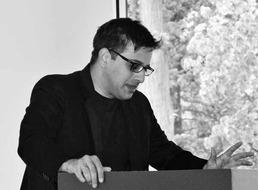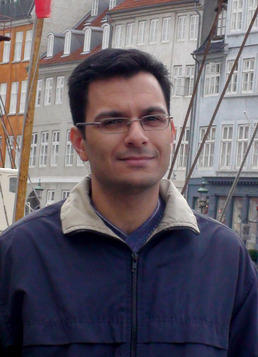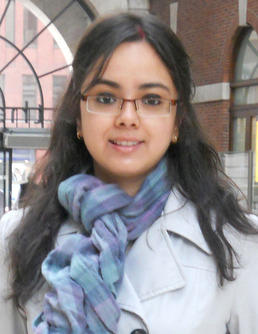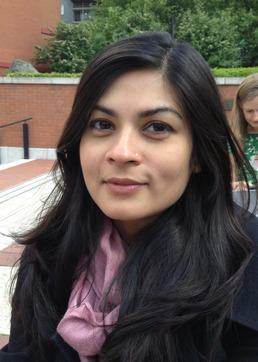Associated Fellows 2013/14
Thibaut D'Hubert: The Celtic Fringe and Early Orientalism in Bengal, c. 1770–1790: Editing and Analyzing the Indo-Persian Texts of the Staatsbibliothek’s John Murray Collection
Thibaut d’Hubert completed his PhD at the Historical and Philological Sciences section of the École Pratique des Hautes Études in Paris in 2010 and then joined the department of South Asian Literatures and Civilizations of the University of Chicago. His research focuses on premodern literary cultures in Bengal, with a special emphasis on translations involving Bengali and Persian. In the framework of the program, Thibaut explores the archive of John Murray MacGregor (1745-1822), a Scottish officer who was instrumental in the foundation of learned societies in England, Scotland and Bengal in the late 18th century. The interpretation of this archive entails a twofold project. The first part is the reconstitution of Murray’s biography based on his English, Persian and Bengali correspondence. The second part looks at Persian translations of Buddhist texts from Arakan (in modern Myanmar) commissioned by Murray. Thibaut studies the cultural layers visible in the process of translation of the Buddhist texts by Murray’s secretaries ‘Azīz Allāh Bukhārī and Ṣādiq ʿAlī. The project as a whole explores the paths linking textual practices and scholarly traditions from Burma to Scotland on the eve of colonialism.
Sonam Kachru: The Elusive Mark of the Mental: Philosophy of Mind with Vasubandhu
Sonam Kachru specializes in the history of philosophy, with a focus on Buddhist and Brahmanical philosophical traditions in premodern South Asia. He completed his PhD from the University of Chicago in 2013, where his dissertation “Dreams, Demons and Beyond: Empiricism and the Philosophy of Mind in Vasubandhu’s Twenty Verses” was devoted to the intersection of metaphysics, natural philosophy, hermeneutics and philosophy of mind in the thought of the Buddhist philosopher from Peshawar, Vasubandhu (fl. 360-430 C.E.). Extending his interest in Vasubandhu as a fellow of Zukunftsphilologie, Sonam seeks to characterize the phenomenon of “thinking in commentary” in Sanskrit letters. In this capacity, he explored rival conceptions of philosophical commentary, and conceptions of history, tradition and truth associated with practices of commentary in fifth-century South Asia. In particular, Sonam Kachru focussed on Vasubandhu's exemplary presentation of commentary, in theory and practice, as a distinctive way in which to engage the relationship between history and the kind of truth Vasubandhu believed was only preserved through critically engaged and rationally reconstructed tradition.
Amr Osman: Zahirism, Literalism and Textualism: Did Literalism Exist in the Islamic Tradition?
Amr Osman is Assistant Professor of Islamic History at Qatar University. He earned his PhD from the Department of Near Eastern Studies at Princeton University in 2010. The subject of his dissertation was the history and doctrine of a medieval school of Islamic law known as the Zahiri madhhab. His research interests include the intellectual history of Islam as well as modern and contemporary Arab politics and thought. He has published articles on the redaction of the Qur’anic text as well as the origin and development of ‘adalat al-sahaba, one of the pillars of Sunni Muslim faith according to which the integrity of all the Companions of the Prophet Muhammad must be accepted for doctrinal as well as practical purposes (such as hadith transmission). He is currently revising his doctoral dissertation for Brill’s Islamic Law and Society series. He is also translating a recent book on Islam, politics and modernity from English to Arabic. As a Zukuntsphilologie fellow, he expanded on aspects of the doctrine of the Zahiri madhhab and its presumed ‘literalist’ approach and, among other things, how this relates to modern legal philosophy and linguistic studies.
Esha Sil: Post-Partitioning Thakurmar Jhuli and Abol Tabol: the Translated Text, the West Bengali Bhadralok, and the East Bengali ‘Other’
Esha Sil completed her MA in Postcolonial Literary and Cultural Studies at the School of English, University of Leeds, U.K., in 2008, and thereafter commenced her doctoral study at the University of Leeds in 2009. She was funded for both her postgraduate and doctoral programs by the School of English Bonamy Dobrée Scholarship. Her research is based on the ‘quintessential’ Bengali leisure pursuit, adda, a long, informal talking session among friends, and takes its cue from Dipesh Chakrabarty’s acclaimed essay on adda to examine this social practice along the theoretical axes of radical capitalism and the 1947 Bengal Partition. She has presented her work at various conferences and is currently co-editing a special issue for Interventions: International Journal of Postcolonial Studies, titled, ‘Re-evaluating the Postcolonial City: Production, Reconstruction, Representation’. Her Zukunftsphilologie fellowship project revisited the textual scholarship of Bengali children’s literature through a study of Sukumar Ray’s anthology of nonsense rhymes, Abol Tabol (Nonsense), and Dakshinaranjan Mitra Majumdar’s Thakurmar Jhuli (Grandmother’s Bag of Stories), a compilation of popular Bengali folktales.
Mishka Sinha: A History of the Transmission of Sanskrit in Britain and America, 1832-1939
Rajeshwari Mishka Sinha was educated at St. Xavier's College, Bombay, the University of Oxford, Emory University and the University of Cambridge. She was a Research Associate at the Centre of South Asian Studies, Cambridge from 2012 to 2013. She is currently revising her doctoral thesis on the history of the transmission of Sanskrit in Britain and America, 1832-1939 for publication. Her article on the transnational translation of the Bhagavad Gītā was published in Modern Intellectual History in 2010, and in Kapila and Devji (eds.), Political Thought in Action: The Bhagavad Gita and Modern India (CUP, 2013). Her chapter on American Orientalism and Modern Scholarship, 1836-1894 will be published in Elmarsafy, Bernard, Atwell (eds.), Debating Orientalism (Palgrave Macmillan, 2013). Her research interests include the intellectual history of orientalism and the cross-cultural transmission of ideas, the transnational material and intellectual history of oriental publishing, the occult as a metamorphosing category of knowledge in the 19th century, and literary Modernism. She uses Bengali, English and Hindi as a native speaker and has studied Sanskrit and German at an advanced level.
Roy Tzohar*: Toward a Framework for Intertextual Analysis of Indian Buddhist Sastra: The Yogacara Theory of Metaphor as a Case Study
Roy Tzohar is Assistant Professor in the East and South Asian Studies Department at Tel Aviv University. He holds a PhD (with Distinction) from the Religion Department at Columbia University (New York, 2011), and an MA (summa cum laude) in philosophy from Tel Aviv University’s Interdisciplinary Program for Outstanding Students. During his Zukunftsphilologie fellowship Roy Tzohar expanded upon his dissertation, dealing with the philosophical role and meaning of figurative language (upacāra) in early Indian Sanskrit philosophical discourse, taking the Buddhist Yogācāra school’s theory of metaphor as a case study. During the research Roy Tzohar focussed on developing the theoretical framework for the intertextual analysis of these materials, substantiating the need for an interrelated analysis of the literary and the philosophical within Buddhist texts, complemented by a diachronic perspective provided by the history of ideas. This work will be integrated into his more comprehensive, ongoing research project about early Yogācāra thought, for which Roy Tzohar has received the Marie Curie IRG fellowship from the EU (CORDIS) and which will culminate in a book manuscript.
*affiliatetd Zukunftsphilologie Fellow












